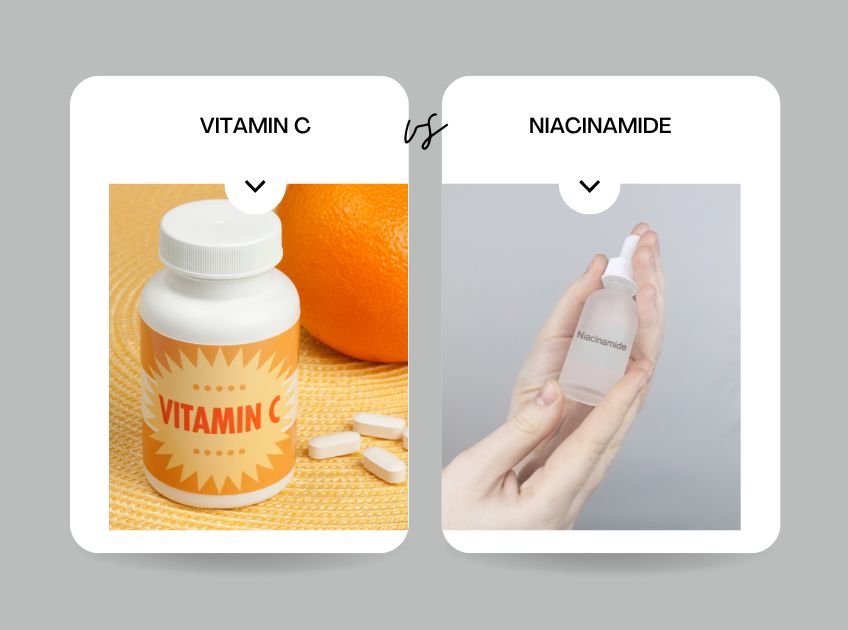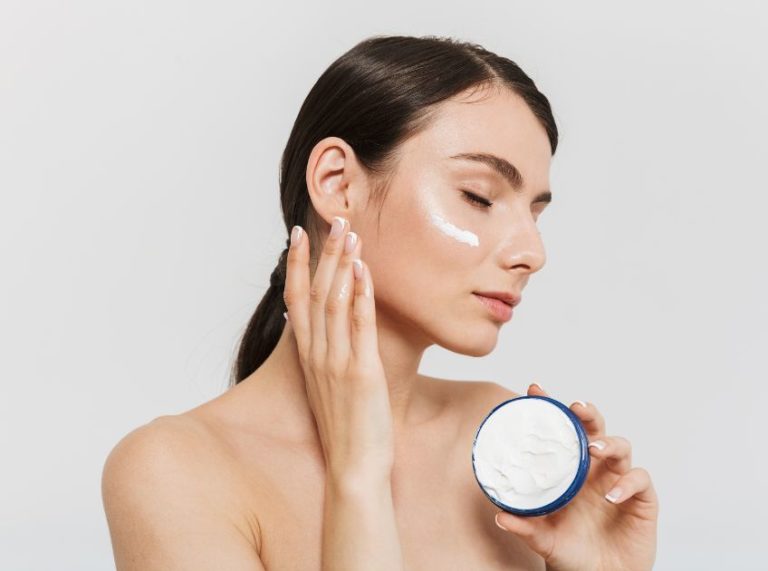
Important: This article is for informational purposes only. Please read our full disclaimer for more details.
Mixing skincare ingredients can feel like experimenting in the chemistry lab. Each ingredient has different molecules and purposes. Some mix well with each other, while others don’t. If they don’t, they could cancel each other out or cause irritation and inflammation.
Niacinamide and Vitamin C are two ingredients with a long list of benefits. These benefits are scientifically proven to improve your skin’s health and appearance. Ideally, these ingredients would work together to improve the skin. So, if you wonder can you use vitamin C and niacinamide together, here’s what you need to know.
Vitamin C

Vitamin C (1), also known as ascorbic acid is a naturally occurring antioxidant. It is best known for its potential to reduce the dark spots and hyperpigmentation. It also helps in brightening the skin.
Vitamin C serves an important role in stabilizing collagen and diminishing wrinkles, fine lines, and sagging skin. It also supports the ability of the skin to neutralize harmful free radicals and helps against other environmental aggressors before they can cause damage.
Due to its protective benefits and therapeutic properties, vitamin C can improve skin appearance for individuals of all ages.
Benefits
- Increases skin’s radiance and glow
- Enhances skin barrier properties
- Support collagen production
- Provides anti-aging effects
- It fades dark spots and helps even skin tone
- Helps fight oxidative stress
- It helps reduce acne scars
Niacinamide

Niacinamide (2) is one ingredient you might have researched in pursuing healthy skin. It is one of the most popular skincare ingredients, and for all the good reasons. Niacinamide, also known as nicotinamide, is a form of vitamin B3. It is an essential nutrient found in a variety of foods and helps maintain healthy cells in the body when ingested. It is a truly multitasking ingredient and plays a crucial part in maintaining healthy skin and its antioxidant properties.
Niacinamide (3) can be used both as a topical application and often as a supplement. Although the body requires this water-soluble vitamin, it cannot make it on its own. Niacinamide is recognized for its capability to reduce pores, diminish dark spots, and normalize fine lines.
Benefits
- Help improve skin elasticity
- It helps to balance skin tone, fading dark spots, and hyperpigmentation
- Brightens the look of the skin
- Support smooth skin textures
- Help prevent damage from UV rays, dirt, and other pollutants
- Reduces inflammation and congestion
- Allows for more effective moisture retention
Can Niacinamide and Vitamin C Be Used Together?
Yes, Vitamin C and niacinamide can definitely be used together. In fact, combining these two ingredients can offer innumerable assistance for the skin.
While Niacinamide (4) helps manage sebum production and reduces inflammation, Vitamin C treats and evens the skin tone. It promotes collagen production, and offers protection for antioxidants.
Can You Mix Vitamin C and Niacinamide?
Yes, it is safe to mix vitamin C and niacinamide. You can mix them together in the same product or combine them from different products that you layer one over the other. This beneficial combination of ingredients is not expected to cause irritation. However, it is expected to make skin healthier since these ingredients offer distinct and synergistic benefits.
Benefits of Using Vitamin C and Niacinamide Together
There are several advantages of using vitamin C and niacinamide together. Niacinamide itself is a skin-restoring component. It can visibly enhance the appearance of enlarged pores, fine lines, and dull skin. At the same time, vitamin C is a potent antioxidant. It helps the skin from the effect of environmental stressors such as free radicals. It also has dullness-diminishing agents that can improve the visible signs of aging.
Together, these ingredients form a powerhouse combo. The benefits of using them together manages uneven skin tone, wrinkles, loosening of skin, and dullness. If you have dry, oily/ combination, or sensitive skin, you will notice a complexion that progressively becomes more radiant, smoother, even, and youthful.
How to Layer Vitamin C and Niacinamide?
The combination of vitamin C and niacinamide was once thought to be incompatible. However, we know that they are a dynamic duo for skin health, radiance, and tone.
The best way to layer vitamin C and niacinamide is to begin with a vitamin C serum. First, wash your face with a gentle cleanser, then dry it with a towel. Apply a vitamin C serum, followed by your preferred niacinamide-containing product.
Vitamin C can be used in both morning and nighttime skincare routines. In the morning time, it can protect your skin from oxidative stress caused by pollutants. At night, it can replenish the drained vitamin C concentration in the skin due to solar radiation.
The order in which to apply niacinamide and vitamin C depends on your specific formulas. A good rule of thumb is to use products from thinnest to thickest consistency for ideal absorption.
Conclusion
You can layer niacinamide and vitamin C. They are both veritable power players in the world of skincare in their own right. Combining your vitamin C and niacinamide product does not have any side effects. It is actually a great move in your search for a radiant complexion.
Image Source : canva
Related Articles
- Can You Use Vitamin C and Niacinamide Together?
- Can You Mix Bakuchiol and Vitamin C Together
- Can I Use Glycolic Acid and Vitamin C Together?
- Epielle Vitamin C Facial Cleansing Facial Tissues Wipes Towelettes Review
- Essential Oils Vitamin C Facial Cleansing Wipes Review
- Eva Naturals Vitamin C Serum Review
- Vitamin C For Kids: Why Do They Need It, Benefits and Side Effects
- Vitamin C Vs Niacinamide – What’s The Difference?
- When to Use Vitamin C Serum Day or Night?
- Alpha Arbutin Vs. Vitamin C: What Happens If Used Together?
- How to Use Hyaluronic Acid and Vitamin C Serum















